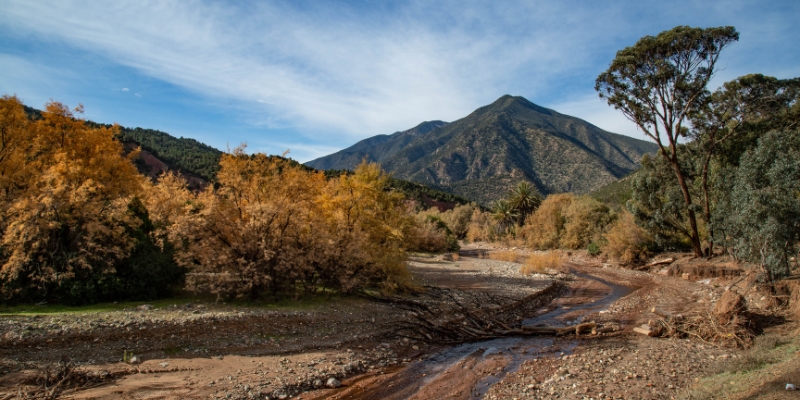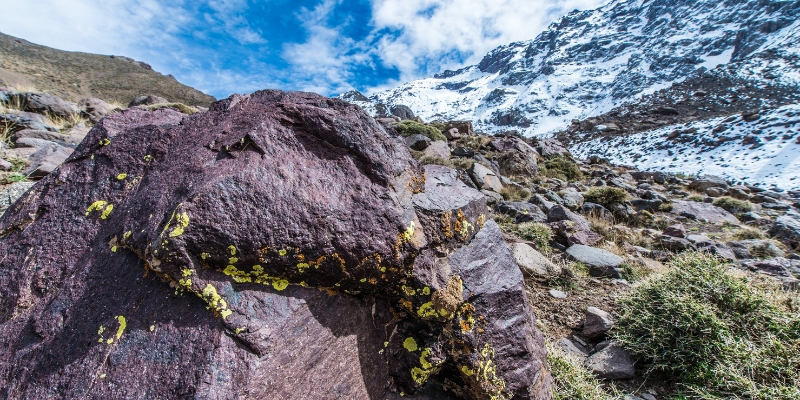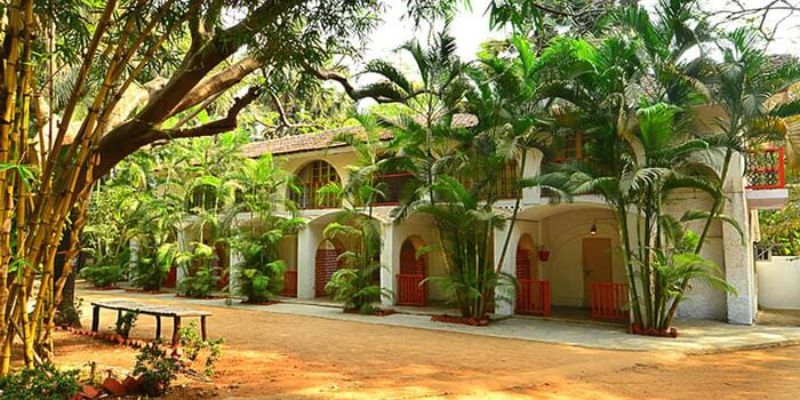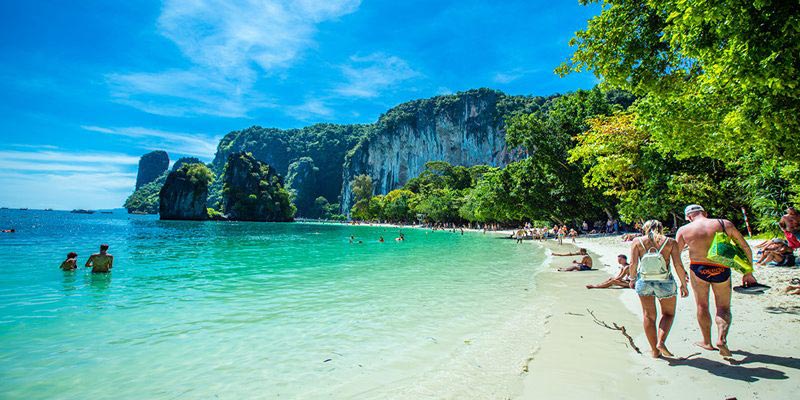Moroccan Toubkal National Park is a stunning wilderness in the High Atlas Mountains noted for its cultural and ecological splendor. Mount Toubkal, Morocco's highest peak at 4,167 meters (13,671 feet), lies in the park, which covers 380 square kilometers. Trekkers and nature lovers enjoy this park, where Berber culture survives. The park was created to preserve the region's distinctive flora and wildlife and encourage sustainable tourism. Visit its rocky terrain, lush valleys, and snow-capped peaks for a fantastic trip.
Since nature and culture meet, Toubkal National Park is an excellent spot for adventurers and cultural explorers. The park has hiking paths, from challenging ascents to gentle strolls through Berber settlements. From the varied landscapes to the welcoming Berber people, visitors can experience nature and culture. Beyond its natural beauty, the park is a paradigm for sustainable ecotourism in North Africa and a treasure trove of experiences.

Things to consider before going to Toubkal National Park:
Weather and Climate:
Toubkal National Park has various weather and climates year-round. The weather may dramatically affect your travel planning. The park typically has four seasons—visitors peak in spring (April–June) and fall (September–November). Mild weather and vivid wildflowers and foliage characterize these seasons. Comfortable daytime temperatures make hiking and trekking excellent. Be ready for chilly evenings, particularly at higher elevations.
June to August is another possibility, although it may be hot, particularly at the lower altitudes. The park's Berber communities and cultural components are best explored in milder weather during this season. However, snow on higher mountain paths may make summit efforts harder. Cold weather and snowfall characterize winter (December–March). The park seems peaceful and beautiful, but avalanches and frigid weather make walking and summiting Toubkal Mountain perilous.
How to Reach:
Toubkal National Park is easy to reach from Marrakech, one of its significant entrances. Marrakech to the park is a lovely journey via the Atlas Mountains with stunning views. Affordable public transportation choices like shared taxis and buses may bring you to the park.
From other cities, long-distance buses or private shuttles may bring you to the park's entrance. Visitors may alternatively fly into Marrakech Menara Airport and drive to the park. The airport is close to Marrakech, making this handy. Good connectivity makes Toubkal National Park accessible from many locations.
Best Time to Visit:
To appreciate Toubkal National Park, come at the correct time. The park's weather changes seasonally. Wandering and exploring are ideal in spring and fall. Spring and fall wildflowers and colorful foliage make the pathways more beautiful during these warm weather months.
June to August is another popular period, although temperatures may be high, particularly at lower altitudes. From December to March, harsh temperatures and heavy snowfall make hiking and summit attempts difficult. Schedule your visit around your tastes and weather tolerance to maximize your journey.
Trails and Hiking Routes:
Toubkal National Park has several hiking and trekking trails for all ability levels. A climb of Mount Toubkal is a famous trek. This difficult two- to three-day walk leads to North Africa's highest mountain. The summit's spectacular vistas and feeling of achievement are satisfying. For easier climbs, the park has several day hikes and shorter trips. Hikes to Aremd, a lovely Berber settlement, and the Setti Fatma Waterfalls are popular day trips.
Hikers will also discover a network of routes to alpine meadows, lush valleys, and parched deserts with unique experiences. These paths vary in difficulty, so choose one that suits your fitness and expectations. Local guides can assist you in choosing the best hiking path for your preferences.
Flora and Fauna Highlights:
Toubkal National Park's abundance of vegetation and animals enhances its natural attractiveness. The park has many plants, including alpine meadow Edelweiss and fragrant herbs like thyme and rosemary. Cedar and juniper woods give way to olive and almond trees in the foothills as you descend from the mountains. These changes reveal the park's ecological fabric.
Park wildlife is very intriguing. The only wild primates in North Africa, barbary macaques, are often seen in cedar woods. Remote places are home to the region's rare Atlas deer. Including Golden Eagles and Griffon Vultures, the park's birds will please birdwatchers. The wide variety offers a pleasant setting where tourists may enjoy nature and see mountain-adapted animals.
Cultural Festivals and Events:
Toubkal National Park is a cultural and ecological treasure. The park conducts cultural festivals and activities year-round to connect tourists with the local community. The Imilchil Marriage Festival, a Berber festival celebrating marriage across areas, is a highlight. This vivid Berber cultural experience includes traditional rituals, music, and dancing.
The February Almond Blossom Festival is another famous event. The region's almond trees produce beautiful pink and white flowers, producing a stunning sight. Visitors may experience Berber culture and seasonal delicacies via local music, dancing, and food during the event.

Key Attractions:
The numerous features of Toubkal National Park captivate tourists. Monumental Toubkal Mountain is the park's centerpiece. Challenges and stunning vistas of adjacent mountains and valleys attract trekkers and mountaineers. Adventurers from throughout the globe remember climbing its peak. The park's Berber heritage is another highlight. As you go, you'll visit Berber communities where you may experience local culture, eat traditional food, and stay in family-run guesthouses. This cultural encounter enriches your visit and enhances your enjoyment.
Additionally, the park's biodiversity is stunning. Barbary macaques, Atlas deer, and many bird species live in alpine meadows and deserts. Unique mountain plants and wildflowers adorn the park's scenery. The park also has beautiful valleys and waterfalls, such as Azzaden and Ourika, nestled among rough hillsides. Setti Fatma and Ouzoud Falls provide refreshments and excellent photos.
Tips for Visitors:
Toubkal National Park visit planning requires some critical suggestions. First and foremost, get any hiking or camping permits to comply with park restrictions that safeguard its natural beauty. Booking ahead, particularly during peak hiking, is recommended for mountain huts, camping, and neighboring village hotels and guesthouses. A native guide can help you understand the culture and surroundings, while mules can carry heavy stuff, making walking easier. High-altitude hiking is strenuous. Therefore, safety is vital. Acclimatize, hydrate, and prepare for weather changes. You should have travel insurance and first aid kits. Packing strong hiking boots, layered clothes, a first aid kit, and water-purifying equipment is crucial. Remember to alter your packing list for the season. These recommendations make visiting Toubkal National Park fun, eco-friendly, and community-friendly.
Conclusion:
Nature, adventure, and culture combine at Toubkal National Park to provide a fantastic experience. You may climb Mount Toubkal, see Berber settlements, or enjoy the national park's wildlife. Follow the rules to enjoy your visit and preserve this natural and cultural treasure. Visit Toubkal National Park, a hidden gem in Morocco's High Atlas Mountains, to experience its breathtaking scenery and kind friendliness.





